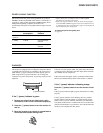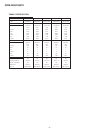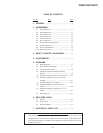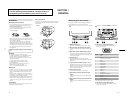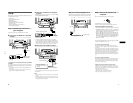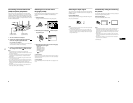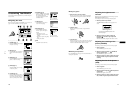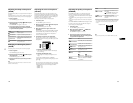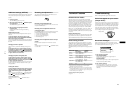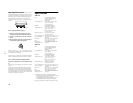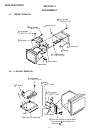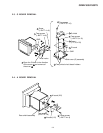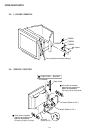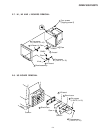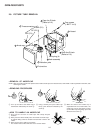
1-6
14
Additional settings (OPTION)
You can manually degauss (demagnetize) the monitor, change the
menu position, set the power saving delay time, and lock the
controls.
1
Press the joystick.
The main MENU appears on the screen.
2
Move the joystick to highlight OPTION and press
the joystick again.
The OPTION menu appears on the screen.
3
Move the joystick to highlight the desired
adjustment item.
Adjust the selected item according to the following
instructions.
Degaussing the screen
The monitor is automatically demagnetized when the power is
turned on.
To manually degauss the monitor, first move the
joystick up or down to select (MANUAL DEGAUSS).
Then move the joystick to the right.
The screen is degaussed for about 3 seconds. If a second degauss
cycle is needed, allow a minimum interval of 20 minutes for the
best result.
Changing the menu’s position.
Change the menu’s position if it is blocking an image on the
screen.
To change the menu’s on-screen position, first move
the joystick up or down to select (OSD H POSITION)
for horizontal adjustment, or (OSD V POSITION) for
vertical adjustment. Then move the joystick to the left
or right to shift the on-screen menu.
Changing the power saving delay time.
To adjust the time it takes to enter the power saving
mode, first move the joystick up or down to select
(PWR SAVE DELAY). Then move the joystick to the left
or right to select the desired time.
If you select OFF, the monitor does not enter power saving mode.
See page 15 for more information about the monitor’s power
saving capabilities.
Locking the controls.
To protect adjustment data by locking the controls, first
move the joystick up or down to select (CONTROL
LOCK). Then move the joystick to the right to select
LOCK.
Only the
1
(power) switch, EXIT, and (CONTROL LOCK)
of the OPTION menu will operate. If any other items are
selected, the mark appears on the screen.
To cancel the control lock
Repeat the procedure above and set (CONTROL LOCK) to
UNLOCK.
Resetting the adjustments
This monitor has the following three reset methods. Use the
RESET button to reset the adjustments.
Resetting a single adjustment item
Use the joystick to select the adjustment item you want to reset,
and press the RESET button.
Resetting all of the adjustment data for the
current input signal
Press the RESET button when no menu is displayed on the screen.
Note that the following items are not reset by this method:
• on-screen menu language (page 8)
• on-screen menu position (page 14)
• power saving delay time (page 14)
• control lock (page 14)
Resetting all of the adjustment data for all input
signals
Press and hold the reset button for more than two seconds.
Note
The RESET button does not function when
(CONTROL LOCK)
is set to LOCK.
ZZ...
RESET
15
EN
Technical Features
Preset and user modes
When the monitor receives an input signal, it automatically
matches the signal to one of the factory preset modes stored in the
monitor’s memory to provide a high quality picture at the center
of the screen. (See page i for a list of the factory preset modes.)
For input signals that do not match one of the factory preset
modes, the digital Multiscan technology of this monitor ensures
that a clear picture appears on the screen for any timing in the
monitor’s frequency range (horizontal: 30 – 107 kHz (GDM-
F400) or 30 – 121 kHz (GDM-F500), vertical: 48 – 160 Hz) . If
the picture is adjusted, the adjustment data is stored as a user
mode and automatically recalled whenever the same input signal
is received.
Note for Windows users
For Windows users, check your video board manual or the utility
program which comes with your graphic board and select the
highest available refresh rate to maximize monitor performance.
Power saving function
This monitor meets the power-saving guidelines set by VESA,
E
NERGY
S
TAR, and NUTEK. If the monitor is connected to a
computer or video graphics board that is DPMS (Display Power
Management Signaling) compliant, the monitor will
automatically reduce power consumption in three stages as shown
below.
* Figures reflect power consumption when no USB compatible
peripherals are connected to the monitor.
**When your computer enters the “active off” mode, the input signal is
cut and NO INPUT SIGNAL appears on the screen. After the time set
in “Changing the power saving delay time.” (page 14) has elapsed, the
monitor enters the power saving mode.
To change the power saving delay time
See page 14.
Troubleshooting
Before contacting technical support, refer to this section.
If thin lines appear on your screen
(damper wires)
The lines you are experiencing on your screen are normal for the
Trinitron monitor and are not a malfunction. These are shadows
from the damper wires used to stabilize the aperture grille and are
most noticeable when the screen’s background is light (usually
white). The aperture grille is the essential element that makes a
Trinitron picture tube unique by allowing more light to reach the
screen, resulting in a brighter, more detailed picture.
On-screen messages
If there is something wrong with the input signal, one of the
following messages appears on the screen. To solve the problem,
see “Trouble symptoms and remedies” on page 16.
1
The input signal condition
OUT OF SCAN RANGE
indicates that the input signal is not supported by the
monitor’s specifications.
NO INPUT SIGNAL
indicates that no signal is input, or that no signal is input from
the selected connector (HD15 or BNC).
2
The connector indicator
This message indicates which connector is receiving the
wrong signal. If there is something wrong with the signal
from both connectors, HD15 and BNC are displayed
alternately.
Power mode Power
consumption
*
1
(power)
indicator
normal
operation
≤
160 W (GDM-F500)
≤
140 W (GDM-F400)
green
1 standby
≤
100 W (GDM-F500)
≤
80 W (GDM-F400)
green and orange
alternate
2 suspend
≤
15 W (GDM-F500)
≤
10 W (GDM-F400)
green and orange
alternate
3 active off**
≤
1 W (GDM-F500)
≤
3 W (GDM-F400)
orange
power off 0 W off
Damper wires
INFORMATION
OUT OF SCAN RANGE
INPUT : HD15



